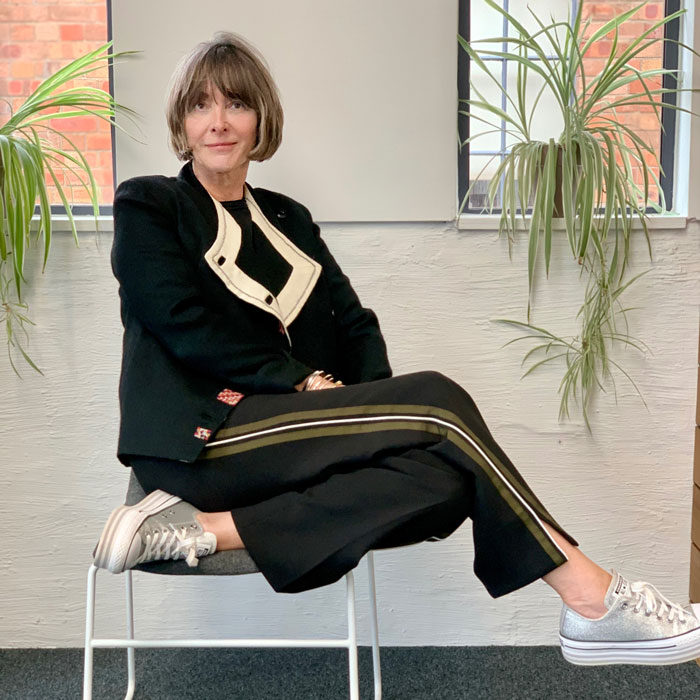Inspirational Women: Claire Menzies
Today we are celebrating International Women’s Day 2023 and have chosen to highlight a wonderful selection of truly inspirational women who are vital members of the commercial interiors sector, each playing a different role. We spoke with Claire Menzies about being an inspiration to others, the women she celebrates, the advice she gives as a mentor and the potential impact of greater gender equality on her work.

Please could you introduce yourself and your role?
My name is Claire Menzies and I am the Chairwoman of Istoria Group, a creative business collective based in Bristol in the UK and Indianapolis in the USA. We’re comprised of three main sister companies: events and exhibitions designers Ignition; retail, branding and hospitality designers Phoenix Wharf and digital innovators Tiny Spark, as well as a small number of ‘Incubator Hub’ companies we help support and grow, as part of our belief in supporting great ideas and mentoring promising entrepreneurs.
My role at Istoria Group is to lead the Board of Directors, with extra focus on supporting the CEO, as well as setting high governance standards, overseeing company strategy, and agreeing the tone of company culture.
What does it feel like to be inspired by, and inspire, people around you?
I work with and mentor any number of inspirational people, constantly leveraging inspirational ideas. I’m always amazed by the number of great ideas that come my way, as long, of course, as I’m open enough to receive them. Being inspired is very much about that open, humble mindset and a true willingness to listen and to hear!
As for being inspiring – for me that’s about the circularity of inspiration, which is like a dance. With mentees in particular, you wave people off into the distance and then they come back round in due course with stories of their success. That’s the real pay-off for me – witnessing their joy as they succeed on their terms.
Which inspirational women do you celebrate?
I’m always inspired by women who excel in difficult situations. Gamechangers for me right now include Orsola de Castro, the co-founder and creative director of Fashion Revolution, which is an activism movement which works towards sustainability in the fashion industry. Orsola’s activism is incredibly important in what is still one of the most wasteful industries on earth. Fashion Revolution was founded following the tragedy of the Rana Plaza 2013 Dhaka garment factory collapse in Bangladesh, which took the lives of more than 1,100 garment workers. Ever since, it has campaigned for more transparency about where and how all our clothes were made. She is also the author of ‘Loved Clothes Last’ and the founder of ‘From Somewhere’, a fashion label featuring 100% upcycled collections.
My second choice is a collective called ‘Women and the Wind’ – a group of young mavericks exploring the connection between nature and the environment by undertaking a voyage across the North Atlantic on Mara Noka, a 50-year-old wooden catamaran. The voyage is currently being made into a documentary, looking at the ‘ever-changing state of the sea, in all its splendour, and duality—shifting between gentleness and rage’, whilst showing how that ‘reflects our own humanity and opens us to contemplation on our relationship with the most unknown parts of ourselves and the planet’.
The real focus of the film and initiative is the 21 million tonnes of microplastic pollution in the Atlantic Ocean, which the film attempts to document in spite of the many practical challenges of doing so. My own past also includes sailing around the world and this undertaking, which combines sailing and sustainability, really speaks to me.
What are three pieces of advice you give to the women you mentor?
First of all – question everything. As a woman in business, you will still get a lot more doors shutting, from getting funding (a notoriously gender-biased sector of finance) to being taken seriously by banks and potential clients alike. So, what I particularly mean by questioning everything is, for example, always asking why a decision has been taken not in your interests and to remind people what they’ve missed by turning you down.
Secondly – be discerning, especially with yourself and your own decisions. Paths of least resistance always look the most tempting, but do always ask yourself if they serve your purpose and are therefore truly the best routes to take.
Finally, and most importantly – never give up. You will get set-backs. Nothing is more certain, but you have to take out your chisel and chip away at them. Your curiosity and desire for what you’re doing need to outlast the knocks that will come your way, so you must always see set-backs as temporary and, in the long run, surmountable.
Would greater gender equality create a more sustainable future for our sector and what would that entail?
Yes, of course! What would that entail? Well, a time machine springs to mind…
Half the world’s population is female, so that’s half of anyone’s potential market for their product or service and should be half of its creative input too to make it ring true. Two halves make a whole after all! Women are still under-represented in so many fields and yet have so much to offer as human capital to any business – but with so much energy, experience and knowledge currently being under-utilised. Sustainability is about looking to the long-term and using all our resources with wisdom, including people.
The route to reducing inequality for women – or for any under-represented group – is about ensuring it’s top of the agenda – in the top 1% of game-changing strategies for any company or organisation. There’s a lot more talk than action or true checks and balances to monitor what’s been or being achieved. We need to change that.




